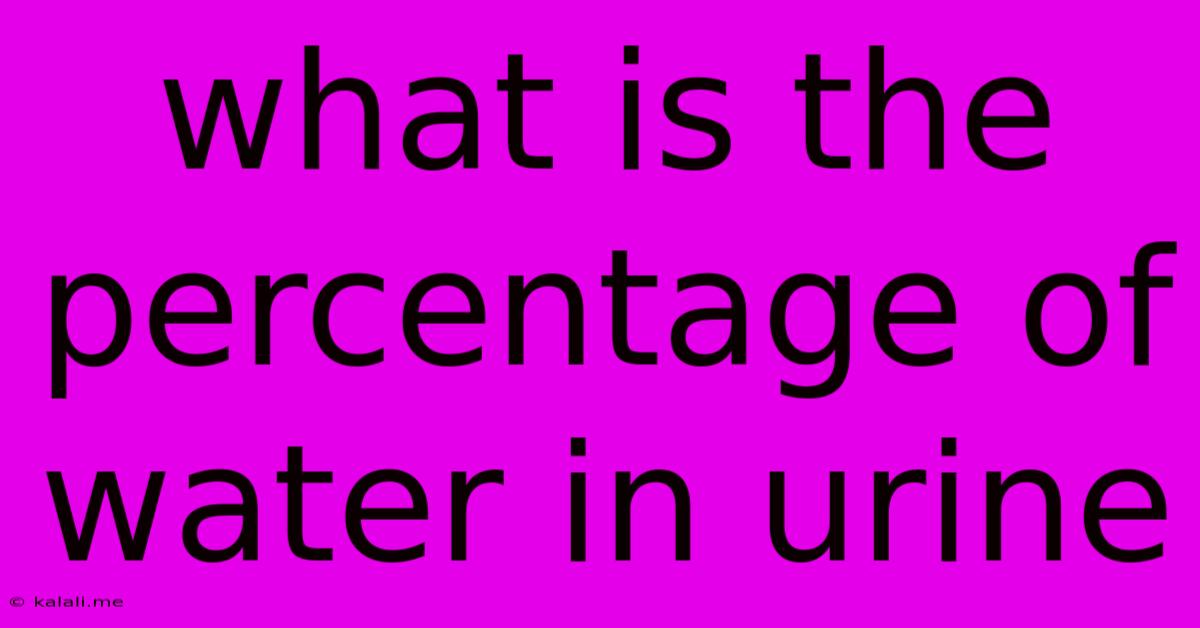What Is The Percentage Of Water In Urine
Kalali
Jun 13, 2025 · 3 min read

Table of Contents
What is the Percentage of Water in Urine? Understanding Urine Composition
Urine, a byproduct of our body's filtration system, is primarily composed of water. But what exactly is the percentage? And what other components contribute to its overall makeup? This article delves into the specifics of urine composition, focusing on the water content and its variations. Understanding this is crucial for interpreting health indicators and maintaining overall well-being.
The Major Component: Water
The majority of urine is, in fact, water. While the exact percentage can fluctuate depending on several factors, urine is approximately 95% water. This significant proportion highlights the vital role of water in the body's excretory processes. The remaining 5% consists of a complex mixture of dissolved substances.
Factors Influencing Water Percentage in Urine
Several factors can influence the precise water percentage in urine:
-
Hydration levels: This is the most significant factor. Dehydration leads to concentrated urine with a lower water percentage (perhaps closer to 90%), while adequate hydration results in more diluted urine with a higher percentage (potentially nearing 98%). The color of your urine is a good visual indicator: dark yellow indicates dehydration, while pale yellow suggests proper hydration.
-
Diet: Consuming large amounts of diuretics like caffeine or alcohol can increase urine production, potentially leading to a slightly higher water percentage. Conversely, a diet low in fluid intake will result in more concentrated urine.
-
Kidney function: Proper kidney function is crucial for regulating water balance. Kidney issues can affect urine concentration and the water percentage.
-
Medical conditions: Certain medical conditions, such as diabetes insipidus or diabetes mellitus, can alter urine composition and water percentage significantly.
-
Medications: Some medications can act as diuretics, affecting the volume and concentration of urine.
Other Components of Urine
While water dominates, understanding the other components is essential for a complete picture:
- Urea: A waste product of protein metabolism, urea is a significant solute in urine.
- Creatinine: Another waste product from muscle metabolism.
- Uric acid: A byproduct of purine metabolism.
- Electrolytes: Including sodium, potassium, chloride, and others. These play a critical role in maintaining fluid balance and nerve function.
- Hormones: Small amounts of various hormones are excreted in urine.
- Pigments: These contribute to the color of urine.
- Toxins: The kidneys help filter out toxins from the body, and some are excreted in the urine.
The Importance of Understanding Urine Composition
Analyzing urine composition, including the water percentage, provides valuable insights into overall health. Changes in urine concentration or the presence of unusual substances can indicate underlying medical issues. Regular hydration and maintaining a balanced diet are crucial for ensuring healthy urine composition. If you notice significant changes in your urine's color, odor, or frequency, consult a healthcare professional.
Conclusion:
While the average percentage of water in urine is approximately 95%, this figure can vary based on individual factors. Understanding the composition of urine, including its water content, helps us monitor our overall hydration status and provides essential clues about potential health concerns. Maintaining proper hydration and a balanced diet are key to supporting healthy kidney function and ensuring the optimal composition of urine.
Latest Posts
Latest Posts
-
Select All Of The True Statements About Grasslands
Jun 14, 2025
-
Difference Between A Sulcus And A Fissure
Jun 14, 2025
-
Which Of The Following Statements About Models Is Correct
Jun 14, 2025
-
How Would You Compare Two Ratios Given In Words
Jun 14, 2025
-
What Are All Of The Factors Of 39
Jun 14, 2025
Related Post
Thank you for visiting our website which covers about What Is The Percentage Of Water In Urine . We hope the information provided has been useful to you. Feel free to contact us if you have any questions or need further assistance. See you next time and don't miss to bookmark.